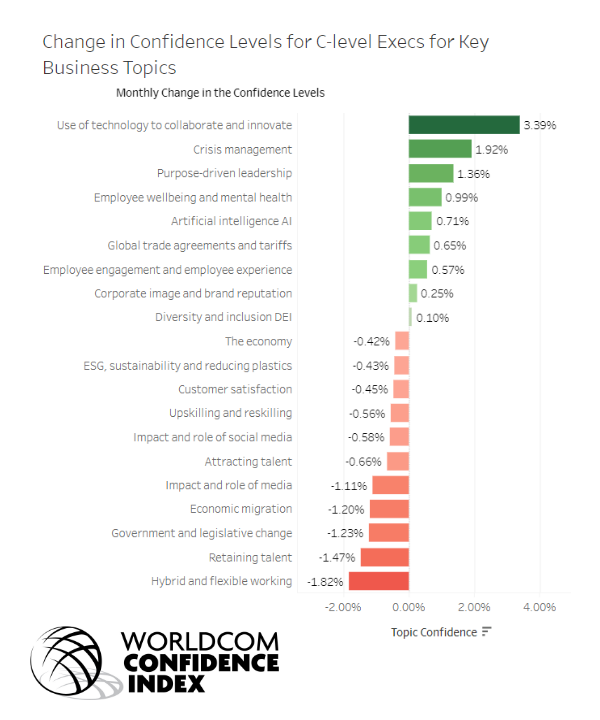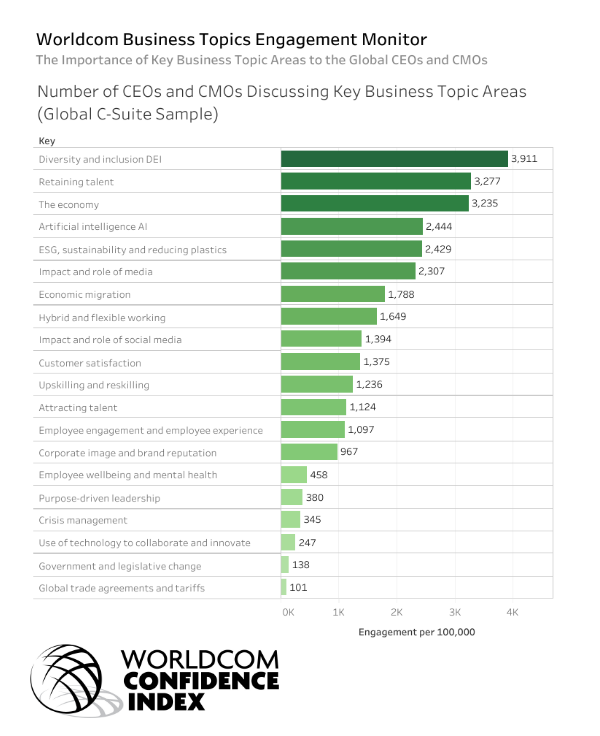Worldcom Confidence Index March 2022 Global Results
GLOBAL BUSINESS LEADERS CAUGHT IN A SQUEEZE BETWEEN THE RAPID BOUNCE BACK FROM THE PANDEMIC AND THE IMPACT OF THE WAR IN UKRAINE ACCORDING TO WORLDCOM CONFIDENCE INDEX
*The Worldcom Confidence Index (WCI) is the first AI-driven ‘living’ global market research, tracking the topics that over 80,000 CEOs and CMOs are commenting on online. The AI-fuelled tracker is updated monthly and is drawn from an active sample of over 100,000 C-Suite executives. It tracks data for two roles, six regions, 42 countries and 11 industry sectors. It identifies the levels of engagement with business topics and how much the level of confidence for each topic has changed. It is the first global study of this type to use AI supported data capture.
.
The Global Economy Sees The Biggest Increase In C Suite Engagement Followed By Attracting Talent In March
The results for March 2022 for the Worldcom Confidence Index show that the economy took an increasing share of the attention of business leaders around the world – with the number of executives commenting on the economy rising the most of all topics since February. However, increasing levels of engagement are not matched by increasing confidence. Confidence in the economy fell by 0.42% last month.
The increasing attention to attracting talent shows leaders want to capitalize on the rebounding economy
The results for March highlight the challenge facing business leaders. On the one hand, a rebounding economy means that engagement in attracting talent has the second-highest rise since February – with 22.5% more leaders commenting on the topic. But the war in Ukraine, and a rapid increase in inflation, are making the recovery less certain.
As leaders reengage with the battle for talent, they also give more attention to their employer brand and the employee experience. Corporate image and brand reputation saw a 25% increase in engagement since February and employee engagement and experience rose by 14.3%. And retaining talent remained at number two on the Index, showing that people, alongside the economy, are uppermost in leaders’ minds.
The Worldcom Confidence Index is the world’s most extensive monthly study of what the C Suite is talking about. And it is the only global study that shows the change in confidence across a range of important business topics. This extensive data is now available via an interactive online portal and can be filtered by geography, industry and role. You can explore the data HERE. Our Worldcom partners in 115 cities are ready to provide even more local context. Contact Todd Lynch to start the discussion.
Artificial Intelligence provides unrivalled view of trending topics and leaders’ confidence levels in addressing them
The Worldcom Confidence Index is the world’s largest monthly study of what the C Suite is talking about. And it is the only global study that shows the change in confidence across a range of important business topics. It is able to operate at this scale, and in nine different languages, because the data is captured using a breakthrough approach powered by artificial intelligence (AI). This allows us to discover the issues that concern leaders – and their confidence levels in addressing them.
The chosen research firm, Advanced Symbolics Inc. (ASI), has developed a patented method of building representative samples and then capturing information with their AI tool. By using ASI’s AI tool, we have produced a truly global perspective on the business issues of the moment and where they rank in terms of leadership attention. We’ve also calculated the confidence index level for every topic and audience and identified how this changes for 42 countries around the world. This is incredibly valuable insight because it not only represents what leaders are talking about, rather than responses to questions, but also shows their confidence or concern in addressing each topic. It means you can compare your own thoughts with more than 100,000 of your global peers.


